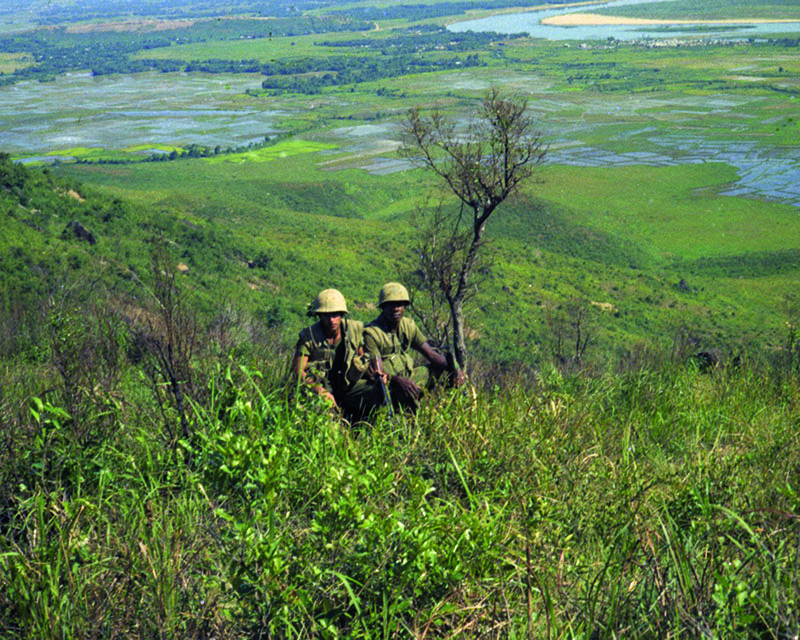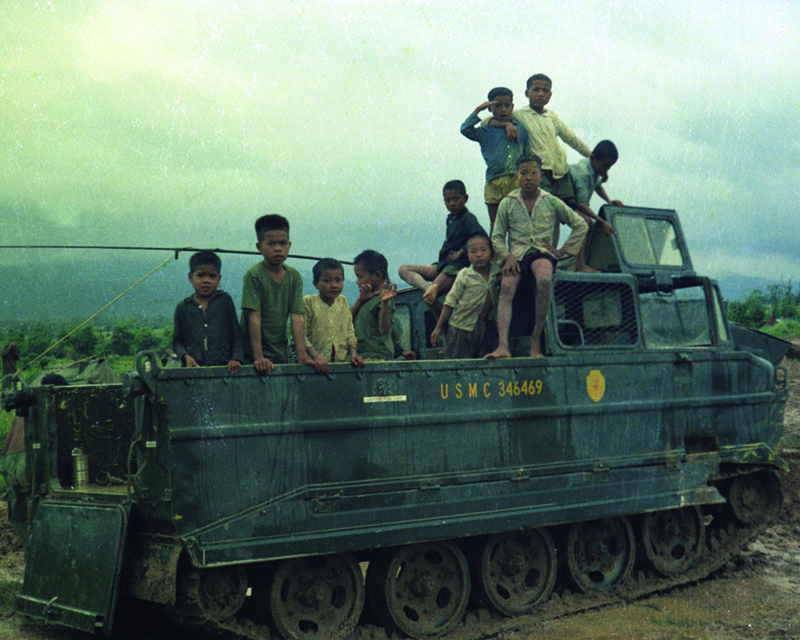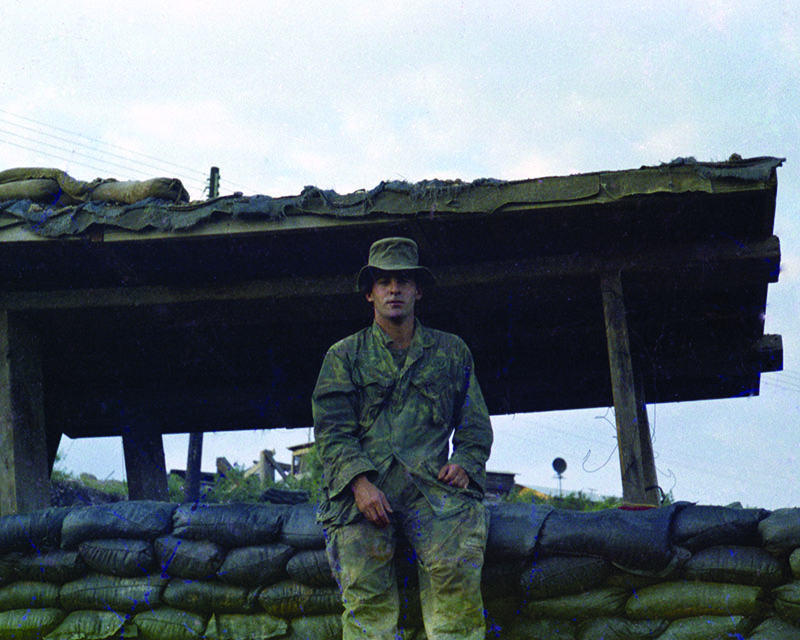
Bright Lights, Small City: A Marine’s Memory of Vietnam
By: Robert RothPosted on March 15, 2025
Executive Editor’s note: I was contacted by Robert Roth, a Marine who served in Vietnam. He sent me an essay he wrote about how he felt when he learned that the South Vietnamese Army had disintegrated. After reading it, I knew Leatherneck had to publish his piece, as it’s something that I think will resonate with Marines of all eras.
It was a night of pain, and the pain started in my eyes. I reached town at the worst possible time, just as night fell. After weeks in the desert, Eilat’s blinding, merciless lights burned my eyes raw. I kept my gaze towards the ground but still had to squint. Equally painful, a cacophony of traffic, music and voices assaulted me, pounded upon my ear drums. Being surrounded by people, so many of them, added to my discomfort. Still, they gave me room. No one was jostling me. Years later, reading about Vietnam vets going off to the Northwoods to get away, it occurred to me that during that time I may have been suffering through a similar though much milder phase.
I had come to Israel attempting to make it my home. I knew it wouldn’t be easy. South Florida had spoiled me. Growing up, the Everglades, with its wonders and adventures, was a short ride west. Gorgeous beaches were a short ride east, and beyond them lay the coral reefs I loved. The Florida Keys to the south were a longer ride, yet worth every mile.
I had traveled enough throughout Israel to know that it held no place that could make me forget South Florida. That is, until I ventured south of Eilat. When the Israelis captured Sinai during the Six Day War, almost the entire peninsula lay ignored and unspoiled. Its barren pastel mountains were surrounded by the Red Sea’s crystal waters, with a shoreline of coral reefs as gorgeous as any in the world. The Israelis had done the hard work of making it habitable in just a few scattered places, without destroying Sinai’s beauty as a whole. Roaming its deserts and mountains, I wandered back into biblical times, and even farther, into the eons that preceded them. In Sinai I had found a place I could spend the rest of my life.
The year was 1975. I was in limbo waiting to go into the Israeli Army. My induction could be weeks, months or even a year away. I had returned to Sinai to look for work, any kind of work, just so I could live there. I found a construction job at the southern tip of the peninsula. It proved all too temporary. Soon after the work ran out, so did my money. I headed north, desperate to find another job in Sinai before reaching Eilat. I failed. Every mile closer had left me more jaded.
Eilat was a place where I did not want to be. It had once served the same purpose as Australia: the judge would ask the defendant, “Jail or Eilat?” That was years previous, but Eilat still functioned as a clogged drain. It caught and stopped the southward flow of Israel’s less desirables. It also caught the world’s hippie, hash-smoking remnants of the ’60s. People were easy to meet. Friends were easy to make. Yet you never really knew who your friends were. Travelers to Eilat often did so on someone else’s passport. The more experienced of them carried a choice of passports. In those years, Israel was crawling with Vietnam vets, especially Marines and Green Berets. Yet I never met one in Eilat. That said something about the place.

Passing through Eilat on the way to Sinai, I had run into a friend from a kibbutz, a fellow volunteer. He was now tending bar at a local nightclub. When I told him of my plans, he said to check back with him if I didn’t find work in Sinai. He could probably get me on as a dishwasher. Now to someone else with a college degree, that might have sounded like an insult. Not to me. I had done dirtier jobs. Besides, I did not intend to make dishwashing my life’s work. If necessary, it would be my Plan B, a means to get enough cash for a return to Sinai for some more job hunting.
My mood had lightened some by the time I reached the nightclub and saw my friend’s smile. He went to ask his boss about the dishwashing job. The smile was gone when he returned. “No dice but check back with me in a week.” So much for Plan B.
I left my friend without mentioning that the few bucks I had would not last even close to a week. Again the lights assaulted me. Plan B’s failure hit me too. Luckily, I had a Plan C—Eilat’s “Slave Market.” It was a street corner where you could stand and usually get a long day’s work for short pay. I had done this before, and it hadn’t killed me. Still, I was depressed about not getting the dishwashing job, and to a degree that seems ridiculous looking back.
Israelis are news junkies. Their addiction is contagious. The first thing most of them do in the morning is turn on the radio to hear what new lethal dangers their tiny country faces, or, worse yet, what tragedies had befallen it during the night. In Sinai, I had gone without news for weeks, so I headed for a magazine stand. The lights around the stand were repellently bright. I forced my eyes open just enough to pick out an Israeli paper and Time magazine. I hated Time because of its snide anti-Israel slant. But Newsweek was even worse. I reached into my pocket and took out my money. When I saw how much I had left, I returned the Israeli paper to its rack. Time would provide more world news, especially about the States.
I headed for the plaza below to find a quiet place with just enough light to read the magazine. The newsstand was separated from the plaza by a dozen steps. About two steps down, I glanced at the magazine’s cover. It showed a map of South Vietnam and a caption indicating that the northern part of the country had fallen to the communists. I didn’t get dizzy. I doubt I got weak in the knees. Yet the shock put me on my ass, literally. I found myself sitting near the top of the steps, with one hand hanging from the round iron railing that ran down their center. I was in a daze, and from something I had known would happen. Yet it had shocked me all the same. People on my left were going up the steps. People on my right were going down them. They must have thought I was on drugs or drunk. Oblivious, I sat in the middle of the stairs, reading, mesmerized, as people paraded up and down at my sides.

There are a few things I still remember about the article. The first and least important was some optimistic American idiot quoted as saying the complete rout of the South Vietnamese Army was probably a good thing. Now these soldiers, many of whom had abandoned their rifles and their uniforms, could regroup and defend Saigon. More importantly, I remember the article’s tone of surprise about the thousands and thousands of Vietnamese civilians who, along with the soldiers, fled the advancing communists in a panic. These were the same civilians the media had wanted you to believe were sympathetic to the communists. Yet the thing I remember most, the thing that hit me the hardest, was a simple picture of a communist soldier standing in Da Nang as if he owned it. Da Nang, a city that we Marines had “owned,” or thought we had owned, had somehow fallen to the communists.
I finished the entire article sitting on those busy steps. When I stood to go down them, I had no idea where I was headed. It did not occur to me to get something to eat, or a beer, or to find a place to sleep. No, I was thinking about the debacle now taking place in Vietnam, and all the misery and loss of life that had led up to it. These thoughts and visions were enough to break my heart—far more than enough—and not for the first time.
A thing that still baffles me is the literally staggering impact that article had on me. And I had yet to see those last choppers evacuating desperate people from that rooftop while leaving so many even more desperate ones behind. How could I be so shocked and saddened by an outcome I had thought inevitable?
You see, after the last combat Marine had left Vietnam, after we had forced the South Vietnamese to sign a ceasefire with the North Vietnamese that just about sealed their fate, yet before we had cut off the supplies that might have, however doubtfully, saved them, I had returned to Vietnam as a civilian. I had my reasons, yet they weren’t necessarily the ones I gave myself. The real reasons we do things can get complicated, sometimes too complicated to understand. People who claim they went to Vietnam out of patriotism or fled to Canada to protest the war may be fooling themselves, yet they are not fooling me. Decisions as consequential as these are never so pure and simple.
Still, I believe the main, vague reason I returned to Vietnam for a few weeks was for one last look before the apocalypse.
I returned accompanied by the guilty feeling that we were abandoning the South Vietnamese to their fate, and that their fate would be tragic. Admittedly, I had no desire to see the shedding of even one more drop of American blood.

We had suffered, bled and lost too much already. Still, the Vietnamese had bled and lost much more. I felt guilty about running out on these people, many of them brave, decent and trusting of us.
Once back, I remember standing in line for a small plane to take me from Da Nang to Huế. Two Army officers in front of me were discussing the ceasefire. It was holding surprisingly well. One officer ran off a list of all the places where it was being kept. He ended the list by saying, “Of course, they’re still going at it in the Arizona.” Of course. The Arizona was a free-fire zone that I and the rest of the 5th Marines knew well. To me, it seemed impossible that any ceasefire would ever take hold in the Arizona Territory. No, it seemed more likely that the Arizona would nurture the flame that would eventually consume the entire country.
I had returned to Vietnam with trepidations that the people would resent my presence. I would be an American traveling alone, not alongside other Marines with M16s at the ready. I might end up a target for their anger at being abandoned. These fears proved groundless. I talked to so many of them on that trip back. Though confused and fearful and sad, they were courteous and friendly. This made me feel good and bad at the same time. More than discomfiting, it made me feel helpless. My strongest memory of those days was something they said. It will stay with me until the day I die. They said it at least three, possibly four times, using almost the exact same words every time.
They would look at me and ask, “You were a soldier here?”
I would nod or say, “Yes.”
They would ask, “Where?”
I would tell them a few of the places I had been. This would answer the literal question, and also the unasked question behind it. Where I had been would tell them who I was, that I was a Marine. Finding this out, they didn’t call me
“Murderer!” or “Psychopath!” or “War criminal!” or “Baby killer!”
No, they looked me right in the eye and said softly, thoughtfully, “Marines, good people, Marines.”
These four simple words broke my heart every time.
Author’s bio: Robert Roth is the author of “Sand in the Wind,” a Vietnam War-era novel, and “Berserkley.” Roth enlisted in the Marine Corps in 1969 after graduating from the University of Florida. He served as a rifleman in Vietnam with the 2nd Battalion, 5th Marine Regiment. Using his GI Bill benefits, he added a BA from the University of California at Berkeley and an MA from Stanford. Beginning in 1975, he served almost 10 years in a mechanized infantry unit of Israeli Army reserves. In the 1982 Lebanon War, he completed four reserve duty tours in-country. These included the original invasion and the Siege of Beirut.




